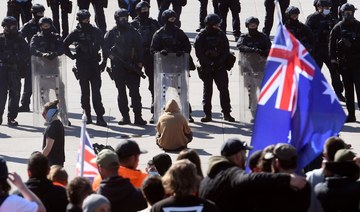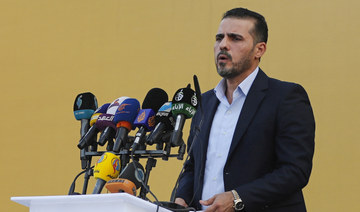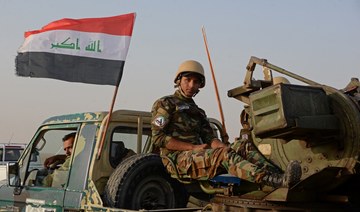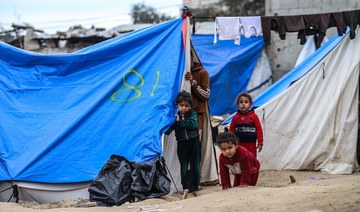JERUSALEM: Israel is pressing ahead with its aggressive campaign of offering coronavirus boosters to almost anyone over 12 and says its approach was further vindicated by a US decision to give the shots to older patients or those at higher risk.
Israeli officials credit the booster shot, which has already been delivered to about a third of the population, with helping suppress the country’s latest wave of COVID-19 infections. They say the differing approaches are based on the same realization that the booster is the right way to go, and expect the US and other countries to expand their campaigns in the coming months.
“The decision reinforced our results that the third dose is safe,” said Dr. Nadav Davidovitch, head of the school of public health at Israel’s Ben-Gurion University and chairman of the country’s association of public health physicians. “The main question now is of prioritization.”
The World Health Organization has called for a moratorium on boosters until at least the end of the year so that more people in poor countries can get their first two doses, but Israeli officials say the booster shot is just as important in preventing infections.
“We know for sure that the current system of vaccine nationalism is hurting all of us, and it’s creating variants,” said Davidovitch, who is also a member of an Israeli government panel of experts. But he added that the problem is “much broader than Israel.”
Israel raced out of the gate early this year to vaccinate most of its adult population after striking a deal with Pfizer to trade medical data in exchange for a steady supply of doses. It has also purchased large quantities of the Moderna and AstraZeneca vaccines.
Most adults had received two doses of the Pfizer vaccine by March, causing infection levels to plummet and allowing the government to lift nearly all coronavirus restrictions.
But in June, the highly infectious delta variant began to spread. After studying the matter, experts concluded that the vaccine remained effective against the virus, but that its efficacy waned roughly five months after the second shot.
In late July, Israel began distributing booster shoots to at-risk citizens, including those over 60. Within weeks, it expanded the campaign to the general population.
More than 3 million of Israel’s 9 million citizens have gotten a third dose of the Pfizer vaccine, according to the Health Ministry.
In a study published last week in the New England Journal of Medicine, Israeli experts said that in people who had been vaccinated five months earlier, the booster increased vaccine efficacy tenfold compared with vaccinated patients who didn’t receive it.
That study tracked about 1 million people 60 and older and found that the booster was “very effective at reducing the rate of both confirmed infection and severe illness,” the Health Ministry said.
A senior Israeli health official, Dr. Sharon Alroy Preiss, was among the experts testifying before the US Food and Drug Administration panel last week in favor of the booster shot. But the regulator decided against boosters for the general population, opting only to authorize it for people aged 65 or older and those in high-risk groups.
Experts cited a lack of safety data on extra doses and also raised doubts about the value of mass boosters, rather than ones targeted to specific groups. The US Centers for Disease Control and Prevention made a similar endorsement Thursday.
The Israeli Health Ministry said the FDA decision “gave validity to the third vaccine operation” underway in Israel, which “decided to act responsibly and quickly in order to treat growing infections.” It said statistics show the booster dose has “restored protection.”
Recent weeks have seen “a declining rate of new infections among the elderly,” the vast majority of whom have received booster shots, and “a continuous increase in the proportion of unvaccinated individuals within the new severe cases,” Dr. Ran Balicer, head of the government’s expert advisory panel on COVID-19, told The Associated Press.
In recent weeks, as the booster campaign has been rolled out, the percentage of unvaccinated among serious COVID-19 cases has climbed, and the overall new cases among people with at least two shots has dropped.
As of Friday, around 70 percent of Israel’s 703 serious cases of COVID-19 were among the unvaccinated, and about 20 percent had not received a booster. A month earlier, after Israel vaccinated 1.5 million people with a third dose, those two groups were equally represented among the serious cases.
Over 60 percent of Israelis — the overwhelming majority of the adult population — have received at least two doses of the coronavirus vaccine.
Some experts noted that the US and Europe were several months behind Israel’s vaccination campaign and predicted those countries would follow suit in the months ahead.
“We are experiencing first a phenomenon that will become apparent likely in many other countries in the coming months and create a similar challenge there,” Balicer said. “Few, if any at all, other countries are walking in our shoes right now.”
The UK already is rolling out a booster campaign, with third doses to be offered to anyone over 50 and other vulnerable groups.
The WHO has called on rich countries to refrain from exhausting vaccine stockpiles on boosters while much of the world has yet to receive any. A third shot may be necessary for people with certain health conditions, but “boosters for the general public are not appropriate at this stage of the pandemic,” it said.
“The longer vaccine inequity persists, the more the virus will circulate and change, the longer social and economic disruptions will continue, and the higher the chances that more variants will emerge that render vaccines less effective,” it said in a statement Friday.
Balicer said that Israel, as a small country, has little effect on global supplies and that its role as the world’s laboratory provides “a very important source of knowledge” for other countries.
Israeli Prime Minister Naftali Bennett has exhorted the public to get vaccine boosters as part of his aggressive public relations campaign since taking office in June.
“Israel is the only country in the world that is giving its citizens this gift of the possibility — both legally and in terms of supply — of a booster,” he said last week.
Balicer said other states should ready national plans for the rollout of booster shots.
“Countries that vaccinated more recently should be prepared for the impact of waning vaccine immunity manifesting in midwinter, further intensifying the challenge,” he said.
Israel says US booster plan supports its own aggressive push
https://arab.news/vdzfx
Israel says US booster plan supports its own aggressive push
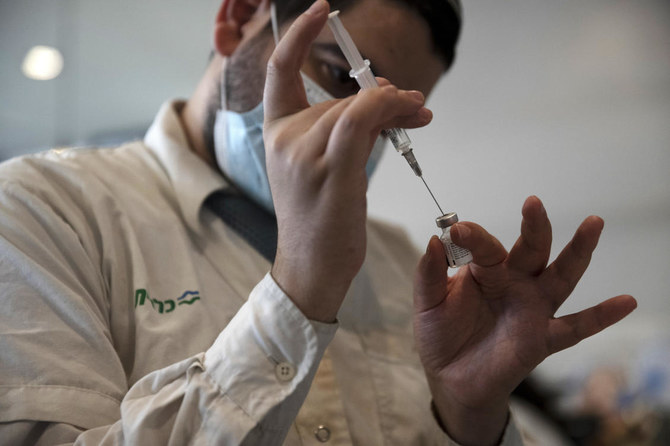
- Israel raced out of the gate early this year to vaccinate most of its adult population
Hospital reports 7 killed, several wounded by Israeli strike in Gaza City
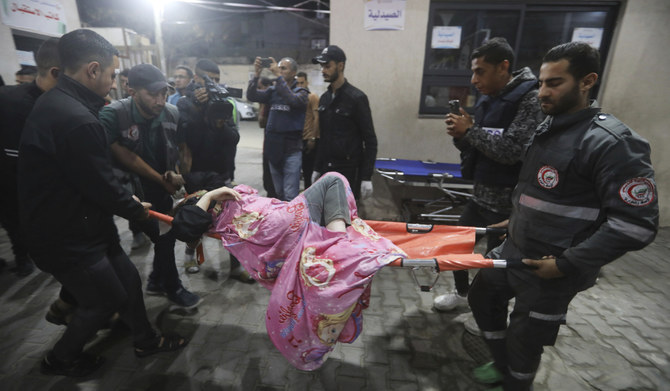
GAZA CITY: An Israeli air strike killed at least seven people and wounded several others early Wednesday in Gaza City, according to a local hospital.
The strike on an apartment in the devastated northern city killed seven members of the same family, the Al-Ahli hospital said, with eyewitnesses on Wednesday also reporting strikes elsewhere in the strip, particularly around Rafah.
Scenes from Israel and Gaza reflect dashed hopes as imminent ceasefire seems unlikely
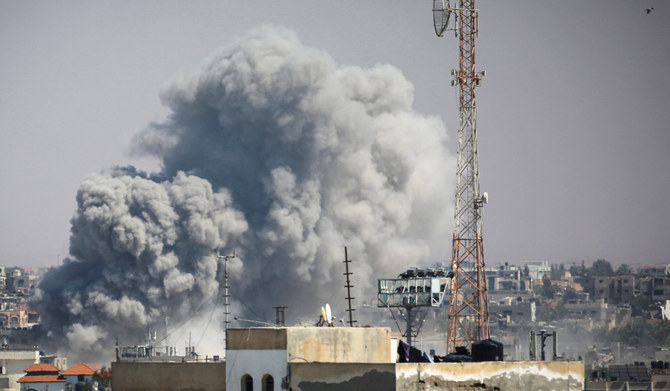
- Israel has killed more than 34,700 Palestinians, according to Gaza’s Health Ministry
- Hundreds of thousands in Gaza have been displaced, many sheltering in nylon tents in Gaza’s south, as “a full-blown famine” develops in the north of the enclave, according to the United Nations
JERUSALEM: An announcement by Hamas late Monday that it had accepted a ceasefire proposal sent people in the streets of Rafah into temporary jubilation, as Palestinian evacuees in the jam-packed town felt their first glimmer of hope the war could end.
For families of Israeli hostages held in Gaza, the announcement raised the possibility that their long wait was coming to an end — that they might soon see their loved ones.
But the fervor was short-lived.
A few hours after Hamas’ announcement, Israel rejected the proposal — which was different from one the two sides had been discussing for days — and said it was sending a team of negotiators for a new round of talks.
By Tuesday morning, Israeli tanks had rolled into Rafah, cementing the dashed hopes among Israelis and Palestinians of any imminent ceasefire.
In Rafah, disillusioned Palestinians spent Tuesday packing up their belongings and preparing to evacuate.
Families of Israeli hostages were incensed, too, and thousands of protesters demonstrated late into the night across the country.
GAZA: PALESTINIANS EVACUATE, CONDEMN COLLAPSE OF DEAL
Across Gaza, Palestinians have been demanding a ceasefire for months, hoping that a stop to the fighting will bring an end to the suffering.
Over 34,000 Palestinians in Gaza have been killed by Israeli fire and airstrikes since the war erupted on Oct. 7., according to the Hamas-run Health Ministry. That day, Hamas militants killed about 1,200 in Israel and took around 250 hostages.
An estimated 100 hostages and the remains of 30 others are still held by Hamas, which insists it will not release them unless Israel ends the war and withdraws from Gaza.
Hundreds of thousands in Gaza have been displaced, many sheltering in nylon tents in Gaza’s south, as “a full-blown famine” develops in the north of the enclave, according to the United Nations.
So when the news came out that Hamas had accepted a ceasefire proposal put forward by Egypt and Qatar, Palestinians poured onto the streets, carrying children on their shoulders and banging pots and pans in excitement. For a moment, it seemed life would get easier.
But in the early hours of Tuesday, Israeli tanks entered the edge of Rafah and took control of one of the key border crossings between Israel and Gaza. Palestinians in the city loaded their belongings onto large trucks and fled.
“They kept giving us hope and telling us tomorrow, or after tomorrow, a truce will take place,” said Najwa Al-Siksik as drones buzzed over her tent camp. “As you can hear,” she said, “this was happening all night long.”
El-Sisik said she had lost all hope of an eventual deal.
“(Israel) doesn’t care about us or our children,” she said. “It only cares about its people. And (Prime Minister Benjamin) Netanyahu only cares about being at the top.”
Raef Abou Labde, who fled to Rafah from the southern Gaza city of Khan Younis earlier in the war, rode atop a car packed with belongings, headed to what was sure to be yet another temporary refuge. Labde said he had little faith that Netanyahu’s far-right government sincerely wanted a ceasefire deal.
“I hope to God that the truce happens,” he said. “But what I see is that Netanyahu doesn’t want a ceasefire. He wants to displace the Palestinian people to Sinai, destroy Gaza and occupy it.”
ISRAEL: PROTESTS GROW, DEMANDING NEW DEAL NOW
In Israel, the Hamas announcement did not provoke the kind of immediate celebrations seen in Gaza. Many relatives of hostages held in Gaza, who have seen what feels like countless rounds of ceasefire negotiations end with no deal, have grown jaded.
“We won’t believe there’s a deal until we start to see some hostages return home,” said Michael Levy, whose 33-year-old brother, Or Levy, remains in captivity.
Still, the back and forth between Israel and Hamas led to boisterous and sustained protests Monday night. Protesters, led by hostage families, blocked the main highway into Tel Aviv, lighting fires on the road.
Demonstrations also broke out in Jerusalem, Haifa, and Beersheba.
Hostage families slammed the government’s inaction on a possible deal in a hearing at Israel’s parliament Tuesday.
“We see all sorts of explanations — this isn’t the deal that we gave them, Hamas changed it,” said Rotem Cooper, whose father Amiram Cooper was kidnapped Oct. 7. He questioned whether military pressure was an effective bargaining tactic to force Hamas to release additional hostages.
For some, the news indicated that a deal was closer than ever before.
Sharone Lifshitz, whose father, Oded, is a hostage, said she believed the differences between the proposal Hamas had accepted and Israel’s “core demands” were not so wide.
“Hamas are shrewd operators,” she said. “Now it’s going to be hard for Israel to just say ‘no.’”
Others said they hoped Israel’s movement into Rafah Tuesday was a tactic to pressure Hamas into a mutually agreeable deal.
“This is a way to show that Israel is serious about its demands,” said Levy. “Hamas can’t just declare they have agreed to a deal with changed terms.”
Powerful Iraqi pro-Iran group says US troops must leave
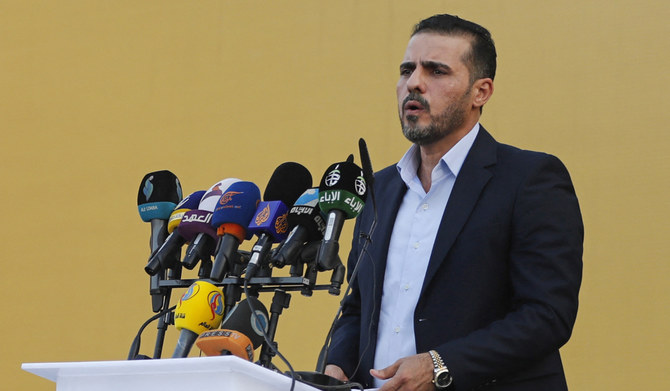
- “We also haven’t seen the necessary seriousness from the Iraqi government to remove them,” the spokesman, Abu Ali Al-Askari, added in a statement
BAGHDAD: Iraq’s powerful Kataeb Hezbollah on Tuesday renewed its call for US troops to withdraw from Iraq, months after the Iran-backed armed group suspended attacks against American forces.
Washington and Baghdad have been engaged in talks over the presence of US troops in Iraq, who are stationed there as part of an international anti-jihadist coalition.
A spokesman for Kataeb Hezbollah said in a statement that the group “did not perceive the American enemy’s seriousness in withdrawing the troops and dismantling its spy bases in Iraq.”
“We also haven’t seen the necessary seriousness from the Iraqi government to remove them,” the spokesman, Abu Ali Al-Askari, added in a statement.
The United States considers Kataeb Hezbollah a “terrorist” group and has repeatedly targeted its operations in recent strikes.
During more than three months, as regional tensions soared over the devastating Israel-Hamas war in Gaza, US troops were targeted more than 165 times in the Middle East, mainly in Iraq and neighboring Syria.
The Islamic Resistance of Iraq, a loose alliance of Iran-backed groups including Kataeb Hezbollah, had claimed the majority of the attacks.
But a deadly drone attack in late January triggered retaliation, with US forces launching dozens of strikes against Tehran-backed groups, including Kataeb Hezbollah.
Three US personnel were killed in the January 28 drone strike in Jordan, near the Syrian border.
Two days later, Kataeb Hezbollah said it was suspending its attacks on US forces.
In February the United States and Iraq resumed talks on the future of the US-led coalition’s presence in Iraq, following a request by Iraqi Prime Minister Mohamed Shia Al-Sudani who has been calling for an end to the coalition’s mission.
The United States has some 2,500 troops in Iraq and 900 in Syria as part of the international coalition against the Islamic State (IS) group.
The coalition was deployed to Iraq at the government’s request in 2014 to help combat IS, which had taken over vast swathes of Iraq and neighboring Syria.
Israel deports a dozen Malawians sent to work on farms

- Israeli farms, a valuable part of the economy, have lost thousands of laborers since the October 7 Hamas attacks triggered the Gaza war
- Israel has killed more than 34,700 Palestinians in Gaza, mostly women and children, according to the health ministry in the Hamas-run territory
LILONGWE, Malawi: Malawi on Tuesday said Israel had deported 12 workers who had walked off farms and orchards, left deserted by the Gaza conflict, that they had been sent to work on.
The workers “in breach of their contracts... abandoned their lawful employment at the farms to start working at the bakery,” Malawi’s government spokesman Moses Kunkuyu said in a statement.
Since November, hundreds of Malawians have flown to Israel as part of a government labor export program aimed at finding jobs for young people and generating desperately needed foreign exchange.
Many Malawians remain without work as the country has been gripped by an economic crisis that has seen massive government spending cuts.
Israeli farms, a valuable part of the economy, have lost thousands of laborers since the October 7 Hamas attacks triggered the Gaza war.
Dozens of foreign workers were among about 240 people that Israel says were kidnapped in the attacks.
Lilongwe cautioned the remaining workers, many of them young men and women, that a breach of contract would “not be tolerated.”
Kunkuyu urged workers to “desist from such behavior as it puts this country into disrepute.”
After being processed, four of the 12 workers arrived back in the southern African country on Tuesday while the other eight would arrive on Wednesday, the state said.
The labor deal has been criticized by rights group and Malawi’s opposition.
In November, the country’s opposition leader Kondwani Nankhumwa as “an evil transaction” because of the threat from the war that has left tens of thousands dead.
“The two governments will ensure the labor export to Israel operates within the prevailing regulatory frameworks,” the Malawian government said.
Two weeks ago, Malawi opened an embassy in Tel Aviv, which its foreign minister Nancy Tembo said reaffirmed the government’s commitment to “long-standing” bilateral relations between the two nations.
She said the labor deal would provide 3,000 workers initially.
US completes construction of Gaza aid pier

WASHINGTON: The US military has completed construction of its Gaza aid pier, but weather conditions mean it is currently unsafe to move the two-part facility into place, the Pentagon said Tuesday.
The pier — which the US military started building last month and which will cost at least $320 million — is aimed at boosting deliveries of desperately needed humanitarian assistance to Gaza, which has been ravaged by seven months of Israeli operations against Hamas.
“As of today, the construction of the two portions of the JLOTS — the floating pier and the Trident pier — are complete and awaiting final movement offshore,” Deputy Pentagon Press Secretary Sabrina Singh told journalists, using an acronym for Joint Logistics Over-the-Shore, the official name for the pier capability.
“Today there are still forecasted high winds and high sea swells, which are causing unsafe conditions for the JLOTS components to be moved. So the pier sections and military vessels involved in its construction are still positioned at the port of Ashdod,” in Israel, Singh said.
US Central Command (CENTCOM) “stands by to move the pier into position in the near future,” she added.
The vessels and the under-construction pier were moved to the port due to bad weather last week. Once the weather clears, the pier will be anchored to the Gaza shore by Israeli soldiers, keeping US troops off the ground.
Aid will then be transported via commercial vessels to a floating platform off the Gaza coast, where it will be transferred to smaller vessels, brought to the pier, and taken to land by truck for distribution.
Plans for the pier were first announced by US President Joe Biden in early March as Israel held up deliveries of assistance by ground, and US Army troops and vessels soon set out on a lengthy trip to the Mediterranean to build the pier.
Some two months later, the humanitarian situation in Gaza remains dire. The United Nations said Tuesday that Israel had denied it access to the Rafah crossing — the key entry point for aid into the besieged territory.
The White House said the closing of Rafah and the other main crossing, Karem Shalom, was “unacceptable” and needed to be reversed.
In addition to seeking to establish a maritime corridor for aid shipments, the United States has also been delivering assistance via the air.
CENTCOM said American C-130 cargo planes dropped more than 25,000 Meal Ready To Eat military rations into Gaza on Tuesday in a joint operation that also delivered the equivalent of more than 13,000 meals of Jordanian food supplies.
“To date the US has dropped 1,200 tons of humanitarian assistance,” CENTCOM said in a statement.
Gaza’s bloodiest-ever war broke out following Hamas’s unprecedented October 7 attack on Israel, which resulted in the deaths of more than 1,170 people, mostly civilians, according to an AFP tally of Israeli official figures.
Israel’s retaliatory offensive has killed at least 34,789 people in Gaza, mostly women and children, according to the Hamas-run territory’s health ministry.




